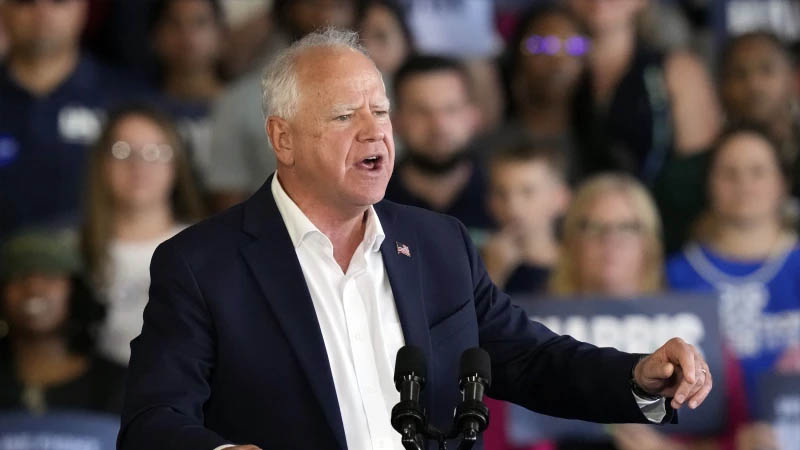In the heated race to the White House, a single word has become a focal point of discussion—”weird.” Minnesota Governor Tim Walz, the running mate of presidential candidate Kamala Harris, has drawn significant attention for his frequent use of this term, particularly when referring to Republican opponents. The word, which has found its way onto T-shirts, memes, and speeches, carries deeper connotations in Walz’s home state of Minnesota.
At the Minnesota State Fair, attendees offered their perspectives on Walz’s choice of words, providing insights into how it resonates with the local culture. The fair’s Horticulture building hosted a gallery of crop art, where pieces were made from seeds, beans, and other plant materials. Among the displays was an artwork depicting Republican figures Sen. JD Vance and former President Donald Trump, accompanied by the quote, “These guys are weird,” attributed to Walz.
Supporters of Walz argue that in the Midwest, particularly in Minnesota, the word “weird” carries a layered meaning. Middle school geography teacher Sarah Black explained, “It’s very layered language. I took it as like, this is his polite, Midwestern way of saying, like, ‘This is bonkers,’ right? Like, this is crazy, without coming right out and saying that.” For many Minnesotans, the term can be a subtle, yet impactful, way to express disapproval without overt hostility, told NPR Reports.
Another attendee, Jill Carey, reflected on the word’s significance, saying, “When you’re growing up and you’re on a playground and a kid’s like, ‘You’re weird,’ it really makes you feel terrible inside. I guess the Minnesota Nice in me doesn’t want anyone to feel terrible inside.” However, she acknowledged the importance of self-reflection, adding, “It’s important to ask yourself, ‘Is my behavior conforming to the standards of respect and dignity toward others?’”
The word “weird” has also been linked to former President Trump by some fairgoers. Megan Yoshida, for instance, believes the term’s simplicity has contributed to its widespread use. “They’re weird, they’re different, they’re, I don’t know, other to us,” she explained. “We’re all kind of like just regular people trying to make a living here in Minnesota. And I think a lot of times in politics, you don’t see that.”
Not everyone is on board with Walz’s choice of words, however. At a nearby booth, Jesse Smith, representing the conservative group Action 4 Liberty, criticized Walz’s rhetoric. “I think it’s ironic. I think he’s throwing stones in a glass house,” Smith said, referring to Walz’s support for a law providing period products in public school restrooms. “If anyone’s weird, it’s him.”
Jim Kelley, a conservative-leaning construction worker, also expressed concern over the use of the word “weird” in political discourse. He argued that labeling a significant portion of the country as “weird” or “different” is divisive. “You’re calling half of the representatives or half of the people of the country weird or deplorable or different. That’s a pretty big percentage either way,” Kelley remarked. “We are the United States of America, and we’re not the divided States of America.”
As the campaign continues, the impact of Walz’s language remains to be seen, with some viewing it as a clever political tool and others as a divisive label.


